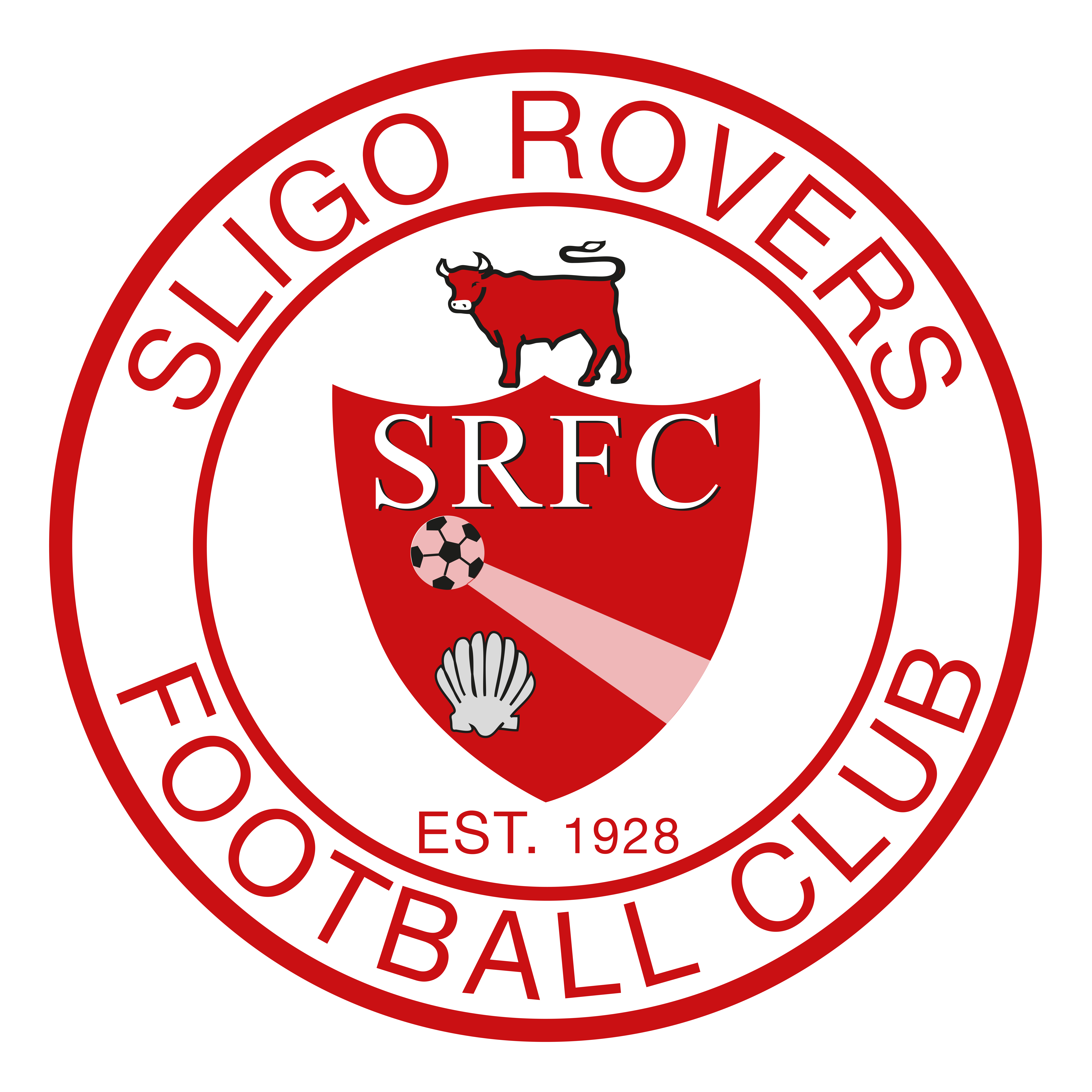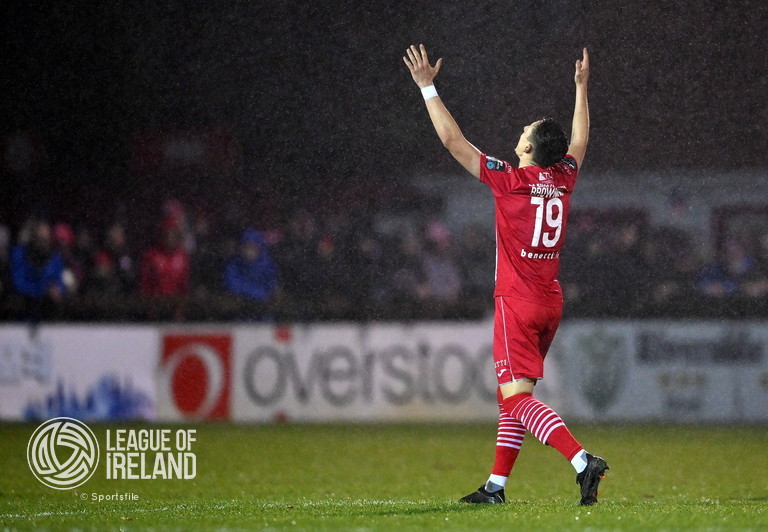The multi-cultural dressing room that represents Sligo Rovers this season includes Lukas Browning who can make a claim for instant hero-worship amongst the Sligo Rovers supporters following a sensational 94th minute equaliser on the opening night of the 2023 season at the Showgrounds.
Lukas was born in Drogheda, he moved to his mother’s native country, Sweden, at the age of two, played up through the under-age ranks, then moved back to Ireland where, as a teenager, he had a stint with St Kevin’s Boys in Dublin.
There was a return to Sweden and on to Holland, back to Sweden again before returning to Ireland this year.
Multi-lingual is also a skill he has mastered and he can speak Swedish, Dutch and English. He has also played under-age for both Sweden and the Republic of Ireland.
Of more importance, on his first game for Sligo Rovers he scored that 94th minute equaliser against the defending champions to earn a 1-1 draw for his new club.
Lukas Browning Lagerfeldt, full name, was born in the shadow of United Park, at the Lourdes Hospital in Drogheda, the son of a Dublin man who lives in Drogheda and a Swedish mother.
Parents are Brian, a successful businessman with a connection to Drogheda Utd, and physiotherapist mother Susanna from Stockholm. Lukas also has one older sister, Laura, who lives and works in Stockholm.
With that sort of pedigree, sport was always going to rate high on the on the radar for a young player who honed his football skills at the well-respected IF Brommapojkarna.
Lukas takes up the story:
“Bromma is a very well-regarded club in Sweden, it has the top Academy for producing players, but it is generally up and down between the top two divisions,” he explained.
“There are five or six players that came through the club in the Swedish national team.
“I went to Holland when I was 17 and played there for three years with FC Twente, I was lucky in that I was able to complete my education also, remotely, and really enjoyed that time.
“It was a good environment and a great education in terms of football, a high standard and players from all over the world.
“I didn’t manage to make the breakthrough there and decided to go back to Sweden a few years ago.
“I joined a club in Gothenberg, Orgryte IS, and was there for two seasons before I moved to Dalkurd, a club based north of Stockholm in Uppsala, for last season.
“Orgryte and Dalkurd were both in the second tier of Swedish football,” he added.
Lukas indicated that his mother (Susanna) has been very helpful to his career.
“My mother is a physio, but it’s not just all about that, her advice about a healthy lifestyle and managing injuries and strains, that’s very useful information for a sportsperson and I try to take that on board at all times, a healthy lifestyle and training,” he stated.
“When I was in Sweden, I joined the under-age National team, but I also wanted to play for Ireland and got a chance about 10 years ago when to work on that when I moved to back to Ireland and had a six-month stint with St Kevin’s Boys.
“In Sweden I learned the Swedish way, play out from the back, pass the ball, but with St Kevin’s it was more about minimising mistakes and I learned something different from my time with the Dublin club.
“I also got the chance to play for the Republic of Ireland at u-15, u-17 and u-19, Colin O’Brien was the 15s manager and then Tom Mohan was the 17s manager, during that time I played for both Sweden and Ireland under-age teams.
“I would say that the mentality of playing the game in Sweden is a bit different to Ireland, the Irish players would have a more aggressive approach.
“There would be a lot of emotion amongst the Irish players representing their country whereas the Swedish players had a calmer approach, more focused on the technical side of the game.
“I played for Ireland against Sweden, I met a lot of players on the Sweden team that I knew from the Academy, it was in a Euro qualifier and the game was played in Finland, it was a bit unusual in a way,” he suggested.
Regarding the move to Sligo, how did that come around?
“It’s all down to my agent, it developed from there and I spoke to the manager (John Russell), it seemed like it would be a good move for me and I was happy to get the chance to sign for the club,” he maintained.
” I visited Sligo before I signed and that helped my decision as well, I had lived in Gothenburg and Stockholm before Sligo.
“I’m happy with the move, Sligo is a very nice place, the people are very welcoming and friendly, then there is the scenery, completely different to Stockholm.
“There is Rosses Point, the beaches, the mountains, they are all really amazing, but the Town is also great.
“I would head out with some of the other players and when we go into the town the people will talk to us, that’s very nice to experience.
“Even in the stadium, there is such a mix of people, older supporters, young supporters, boys and girls, all out to enjoy the game in a real community type of way.
“Football is football no matter where you are and we all know that results are important, but it’s a bit different in Sligo, there is the friendliness of the local people, very enjoyable.
“My total focus is on football at the moment, it’s a short career and I have to make the best of it while I can.
“The schedule in the League of Ireland is fairly hectic and the games are coming along fairly quickly.
“I’m part of a new squad for this season and we will find more improvement and consistency as the season progresses.
“There is a lot of different languages in the dressing room, but we generally communicate in English,” he said.
Asked if he could tell the referee something in Dutch or Swedish and get away with it, Lukas didn’t think so.
“I think if I tried that the referee would get the message fairly quickly and I mightn’t get away with it, so, no, I won’t be trying that, unless it’s a positive comment,” he indicated.
“I picked up a yellow card last week against Drogheda, I thought it was a bit harsh and when you get a card early in the game it changes the way you have to play.
“The conditions were difficult due to the wind and rain and I felt that it contributed to the outcome, the tackle I made it actually looked much worse than it was, but nothing you can do about that.
“Look, refereeing isn’t easy and most people love to complain about decisions, whether it’s here in Ireland, in Sweden or in Holland,
“What I find here is that there are some referees and it’s possible to talk to them, others not so much, but it has to be difficult for the referee also, especially if he has a large group of players all shouting at him at once,” he suggested.
And what about that equaliser against Shamrock Rovers in the opening game of the season?
“It was great to get the equaliser in that game, I think we deserved it, but I didn’t really realise at the time what it meant to everyone, especially the supporters, but I found out about that afterwards,” he explained as he also answered a query about playing on artificial pitches.
“Firstly, all games should be on grass, where possible, that not always the situation in Sweden, but here in Ireland I think games should be on grass.
“I have no problem playing on the astro pitches, I grew up with that in Sweden and it was fine, good quality astro.
“I find here, in Derry and Dundalk, the astro isn’t as good a quality as it could be, I think that’s the real issue, the standard of the pitch, it’s not a big issue for me, but I’d still prefer to play on a grass pitch,” he concluded.

